Business Law Assignment - Problem Solving Questions, May 2019
VerifiedAdded on 2023/01/04
|9
|1864
|44
Homework Assignment
AI Summary
This business law assignment presents two problem-solving questions. The first question examines David's liability to Nu Shampoo Pty Ltd for breaching a restraint of trade clause and the potential liability of David and Monica regarding a loan from Standard Bank, considering the corporate veil. The second question explores the liabilities and rights of partners in a partnership, addressing scenarios involving secret profits, unauthorized transactions, and the scope of implied authority. Both questions require an analysis using the ILAC method (Issue, Law, Application, Conclusion) to determine the legal outcomes and responsibilities of the involved parties, referencing relevant case law and legislation such as the Partnership Act 1892 (NSW).
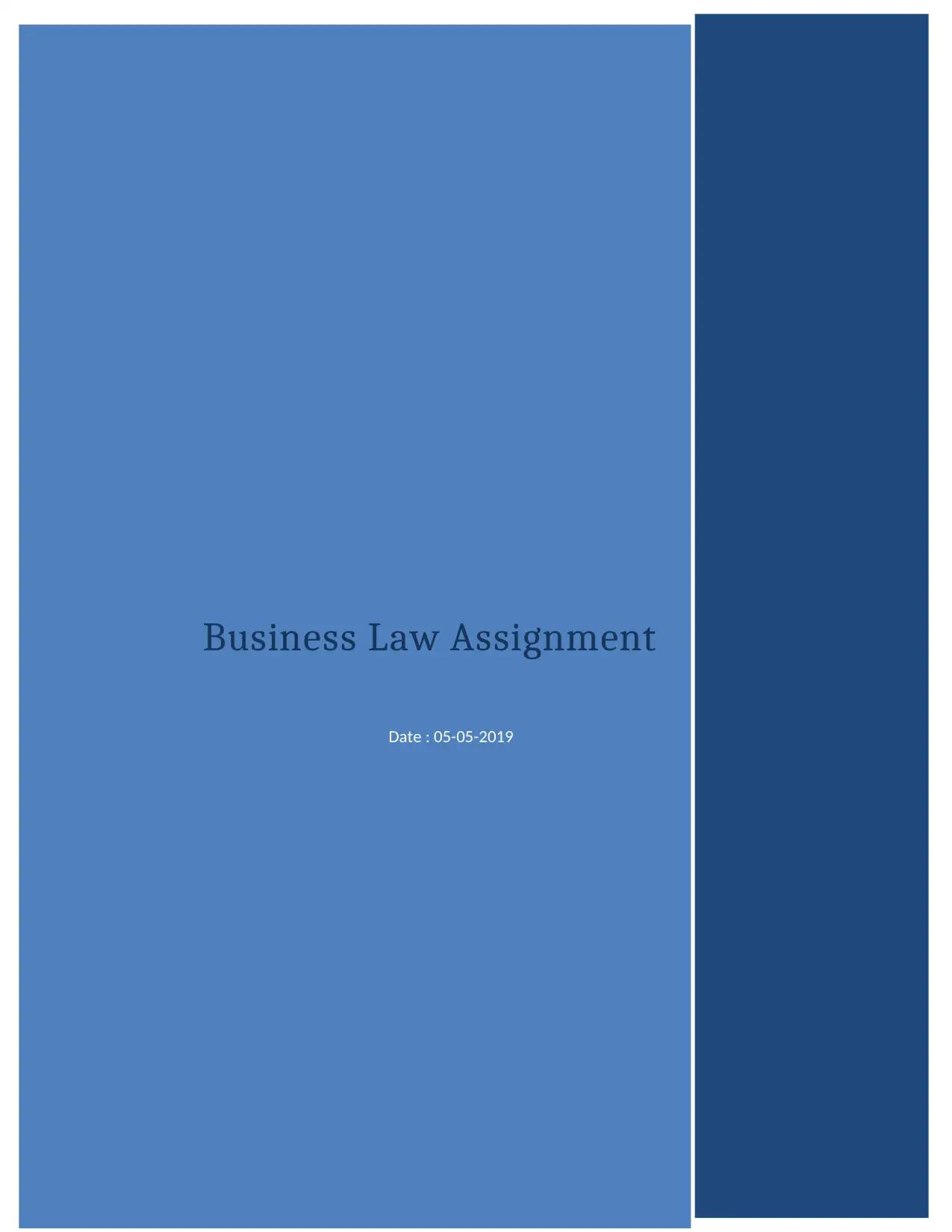
Running Head: BUSINESS AND CORPORATION LAW 0
Business Law Assignment
Date : 05-05-2019
Business Law Assignment
Date : 05-05-2019
Paraphrase This Document
Need a fresh take? Get an instant paraphrase of this document with our AI Paraphraser
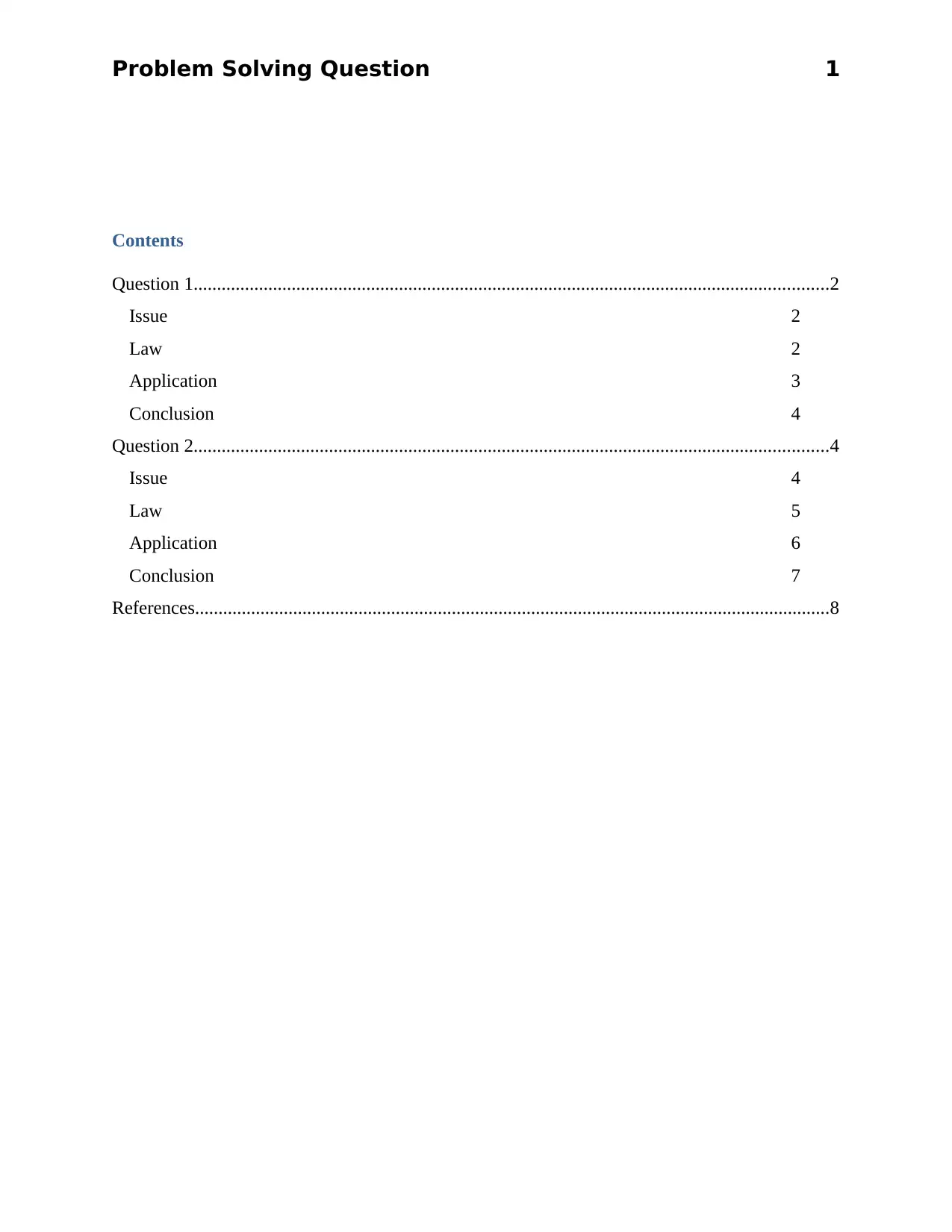
Problem Solving Question 1
Contents
Question 1........................................................................................................................................2
Issue 2
Law 2
Application 3
Conclusion 4
Question 2........................................................................................................................................4
Issue 4
Law 5
Application 6
Conclusion 7
References........................................................................................................................................8
Contents
Question 1........................................................................................................................................2
Issue 2
Law 2
Application 3
Conclusion 4
Question 2........................................................................................................................................4
Issue 4
Law 5
Application 6
Conclusion 7
References........................................................................................................................................8
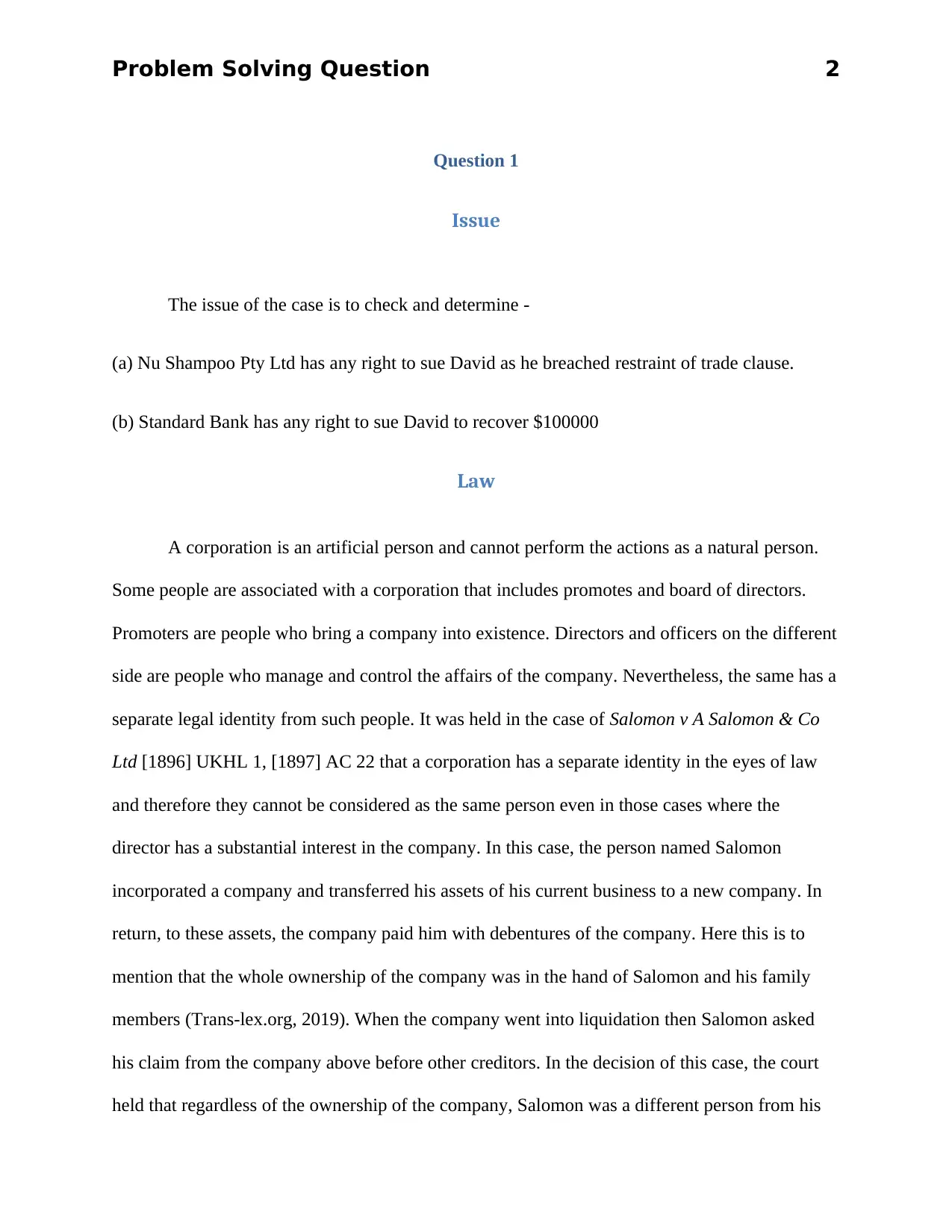
Problem Solving Question 2
Question 1
Issue
The issue of the case is to check and determine -
(a) Nu Shampoo Pty Ltd has any right to sue David as he breached restraint of trade clause.
(b) Standard Bank has any right to sue David to recover $100000
Law
A corporation is an artificial person and cannot perform the actions as a natural person.
Some people are associated with a corporation that includes promotes and board of directors.
Promoters are people who bring a company into existence. Directors and officers on the different
side are people who manage and control the affairs of the company. Nevertheless, the same has a
separate legal identity from such people. It was held in the case of Salomon v A Salomon & Co
Ltd [1896] UKHL 1, [1897] AC 22 that a corporation has a separate identity in the eyes of law
and therefore they cannot be considered as the same person even in those cases where the
director has a substantial interest in the company. In this case, the person named Salomon
incorporated a company and transferred his assets of his current business to a new company. In
return, to these assets, the company paid him with debentures of the company. Here this is to
mention that the whole ownership of the company was in the hand of Salomon and his family
members (Trans-lex.org, 2019). When the company went into liquidation then Salomon asked
his claim from the company above before other creditors. In the decision of this case, the court
held that regardless of the ownership of the company, Salomon was a different person from his
Question 1
Issue
The issue of the case is to check and determine -
(a) Nu Shampoo Pty Ltd has any right to sue David as he breached restraint of trade clause.
(b) Standard Bank has any right to sue David to recover $100000
Law
A corporation is an artificial person and cannot perform the actions as a natural person.
Some people are associated with a corporation that includes promotes and board of directors.
Promoters are people who bring a company into existence. Directors and officers on the different
side are people who manage and control the affairs of the company. Nevertheless, the same has a
separate legal identity from such people. It was held in the case of Salomon v A Salomon & Co
Ltd [1896] UKHL 1, [1897] AC 22 that a corporation has a separate identity in the eyes of law
and therefore they cannot be considered as the same person even in those cases where the
director has a substantial interest in the company. In this case, the person named Salomon
incorporated a company and transferred his assets of his current business to a new company. In
return, to these assets, the company paid him with debentures of the company. Here this is to
mention that the whole ownership of the company was in the hand of Salomon and his family
members (Trans-lex.org, 2019). When the company went into liquidation then Salomon asked
his claim from the company above before other creditors. In the decision of this case, the court
held that regardless of the ownership of the company, Salomon was a different person from his
⊘ This is a preview!⊘
Do you want full access?
Subscribe today to unlock all pages.

Trusted by 1+ million students worldwide
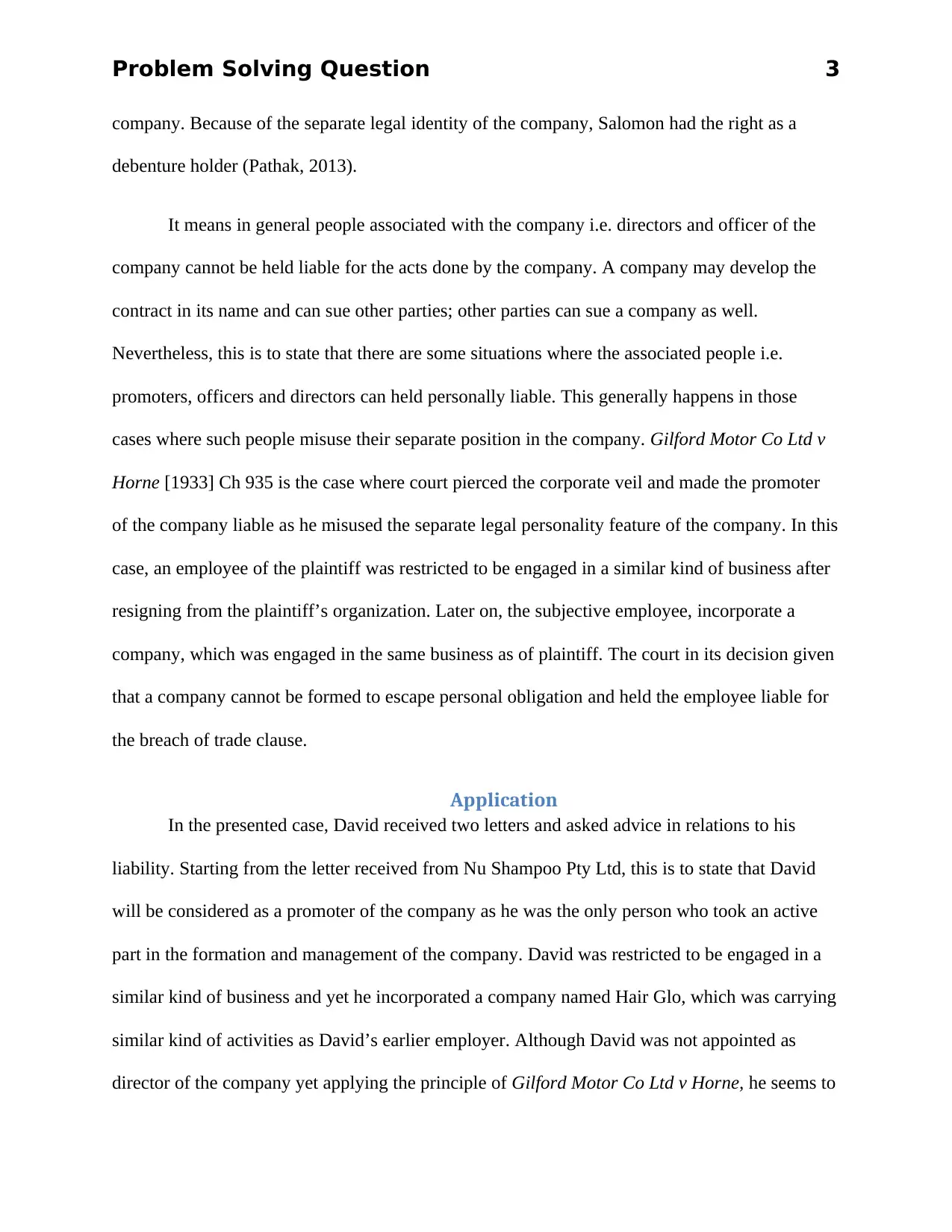
Problem Solving Question 3
company. Because of the separate legal identity of the company, Salomon had the right as a
debenture holder (Pathak, 2013).
It means in general people associated with the company i.e. directors and officer of the
company cannot be held liable for the acts done by the company. A company may develop the
contract in its name and can sue other parties; other parties can sue a company as well.
Nevertheless, this is to state that there are some situations where the associated people i.e.
promoters, officers and directors can held personally liable. This generally happens in those
cases where such people misuse their separate position in the company. Gilford Motor Co Ltd v
Horne [1933] Ch 935 is the case where court pierced the corporate veil and made the promoter
of the company liable as he misused the separate legal personality feature of the company. In this
case, an employee of the plaintiff was restricted to be engaged in a similar kind of business after
resigning from the plaintiff’s organization. Later on, the subjective employee, incorporate a
company, which was engaged in the same business as of plaintiff. The court in its decision given
that a company cannot be formed to escape personal obligation and held the employee liable for
the breach of trade clause.
Application
In the presented case, David received two letters and asked advice in relations to his
liability. Starting from the letter received from Nu Shampoo Pty Ltd, this is to state that David
will be considered as a promoter of the company as he was the only person who took an active
part in the formation and management of the company. David was restricted to be engaged in a
similar kind of business and yet he incorporated a company named Hair Glo, which was carrying
similar kind of activities as David’s earlier employer. Although David was not appointed as
director of the company yet applying the principle of Gilford Motor Co Ltd v Horne, he seems to
company. Because of the separate legal identity of the company, Salomon had the right as a
debenture holder (Pathak, 2013).
It means in general people associated with the company i.e. directors and officer of the
company cannot be held liable for the acts done by the company. A company may develop the
contract in its name and can sue other parties; other parties can sue a company as well.
Nevertheless, this is to state that there are some situations where the associated people i.e.
promoters, officers and directors can held personally liable. This generally happens in those
cases where such people misuse their separate position in the company. Gilford Motor Co Ltd v
Horne [1933] Ch 935 is the case where court pierced the corporate veil and made the promoter
of the company liable as he misused the separate legal personality feature of the company. In this
case, an employee of the plaintiff was restricted to be engaged in a similar kind of business after
resigning from the plaintiff’s organization. Later on, the subjective employee, incorporate a
company, which was engaged in the same business as of plaintiff. The court in its decision given
that a company cannot be formed to escape personal obligation and held the employee liable for
the breach of trade clause.
Application
In the presented case, David received two letters and asked advice in relations to his
liability. Starting from the letter received from Nu Shampoo Pty Ltd, this is to state that David
will be considered as a promoter of the company as he was the only person who took an active
part in the formation and management of the company. David was restricted to be engaged in a
similar kind of business and yet he incorporated a company named Hair Glo, which was carrying
similar kind of activities as David’s earlier employer. Although David was not appointed as
director of the company yet applying the principle of Gilford Motor Co Ltd v Horne, he seems to
Paraphrase This Document
Need a fresh take? Get an instant paraphrase of this document with our AI Paraphraser
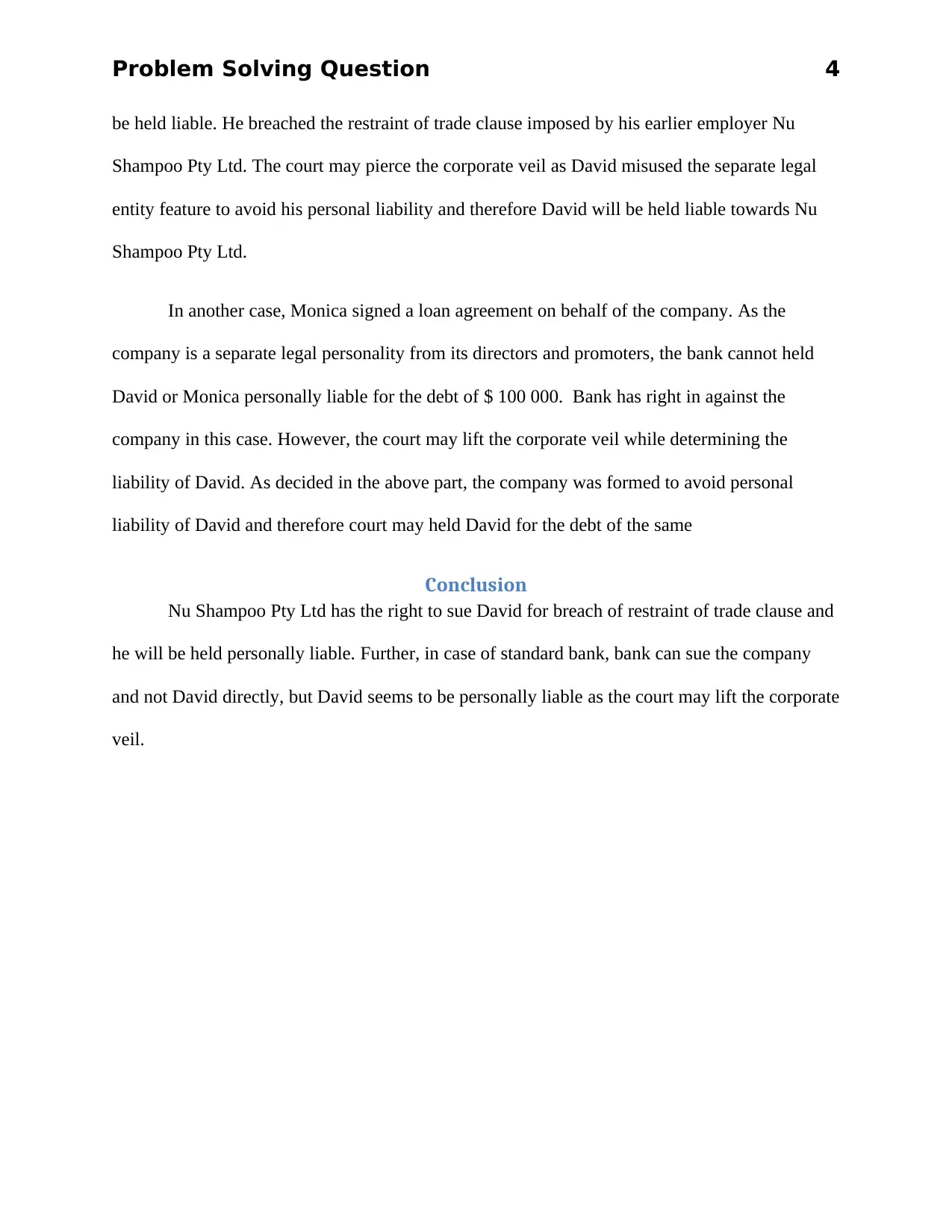
Problem Solving Question 4
be held liable. He breached the restraint of trade clause imposed by his earlier employer Nu
Shampoo Pty Ltd. The court may pierce the corporate veil as David misused the separate legal
entity feature to avoid his personal liability and therefore David will be held liable towards Nu
Shampoo Pty Ltd.
In another case, Monica signed a loan agreement on behalf of the company. As the
company is a separate legal personality from its directors and promoters, the bank cannot held
David or Monica personally liable for the debt of $ 100 000. Bank has right in against the
company in this case. However, the court may lift the corporate veil while determining the
liability of David. As decided in the above part, the company was formed to avoid personal
liability of David and therefore court may held David for the debt of the same
Conclusion
Nu Shampoo Pty Ltd has the right to sue David for breach of restraint of trade clause and
he will be held personally liable. Further, in case of standard bank, bank can sue the company
and not David directly, but David seems to be personally liable as the court may lift the corporate
veil.
be held liable. He breached the restraint of trade clause imposed by his earlier employer Nu
Shampoo Pty Ltd. The court may pierce the corporate veil as David misused the separate legal
entity feature to avoid his personal liability and therefore David will be held liable towards Nu
Shampoo Pty Ltd.
In another case, Monica signed a loan agreement on behalf of the company. As the
company is a separate legal personality from its directors and promoters, the bank cannot held
David or Monica personally liable for the debt of $ 100 000. Bank has right in against the
company in this case. However, the court may lift the corporate veil while determining the
liability of David. As decided in the above part, the company was formed to avoid personal
liability of David and therefore court may held David for the debt of the same
Conclusion
Nu Shampoo Pty Ltd has the right to sue David for breach of restraint of trade clause and
he will be held personally liable. Further, in case of standard bank, bank can sue the company
and not David directly, but David seems to be personally liable as the court may lift the corporate
veil.
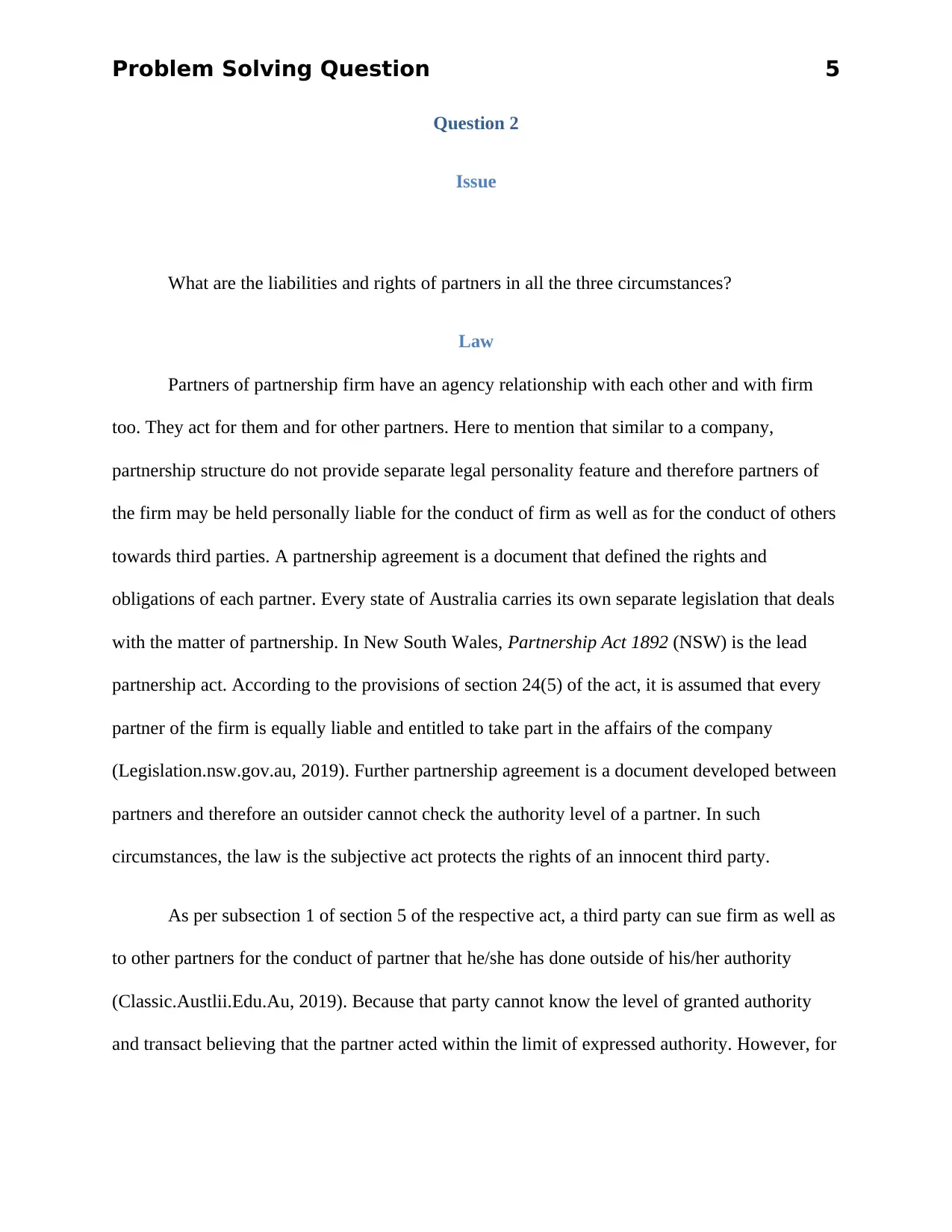
Problem Solving Question 5
Question 2
Issue
What are the liabilities and rights of partners in all the three circumstances?
Law
Partners of partnership firm have an agency relationship with each other and with firm
too. They act for them and for other partners. Here to mention that similar to a company,
partnership structure do not provide separate legal personality feature and therefore partners of
the firm may be held personally liable for the conduct of firm as well as for the conduct of others
towards third parties. A partnership agreement is a document that defined the rights and
obligations of each partner. Every state of Australia carries its own separate legislation that deals
with the matter of partnership. In New South Wales, Partnership Act 1892 (NSW) is the lead
partnership act. According to the provisions of section 24(5) of the act, it is assumed that every
partner of the firm is equally liable and entitled to take part in the affairs of the company
(Legislation.nsw.gov.au, 2019). Further partnership agreement is a document developed between
partners and therefore an outsider cannot check the authority level of a partner. In such
circumstances, the law is the subjective act protects the rights of an innocent third party.
As per subsection 1 of section 5 of the respective act, a third party can sue firm as well as
to other partners for the conduct of partner that he/she has done outside of his/her authority
(Classic.Austlii.Edu.Au, 2019). Because that party cannot know the level of granted authority
and transact believing that the partner acted within the limit of expressed authority. However, for
Question 2
Issue
What are the liabilities and rights of partners in all the three circumstances?
Law
Partners of partnership firm have an agency relationship with each other and with firm
too. They act for them and for other partners. Here to mention that similar to a company,
partnership structure do not provide separate legal personality feature and therefore partners of
the firm may be held personally liable for the conduct of firm as well as for the conduct of others
towards third parties. A partnership agreement is a document that defined the rights and
obligations of each partner. Every state of Australia carries its own separate legislation that deals
with the matter of partnership. In New South Wales, Partnership Act 1892 (NSW) is the lead
partnership act. According to the provisions of section 24(5) of the act, it is assumed that every
partner of the firm is equally liable and entitled to take part in the affairs of the company
(Legislation.nsw.gov.au, 2019). Further partnership agreement is a document developed between
partners and therefore an outsider cannot check the authority level of a partner. In such
circumstances, the law is the subjective act protects the rights of an innocent third party.
As per subsection 1 of section 5 of the respective act, a third party can sue firm as well as
to other partners for the conduct of partner that he/she has done outside of his/her authority
(Classic.Austlii.Edu.Au, 2019). Because that party cannot know the level of granted authority
and transact believing that the partner acted within the limit of expressed authority. However, for
⊘ This is a preview!⊘
Do you want full access?
Subscribe today to unlock all pages.

Trusted by 1+ million students worldwide
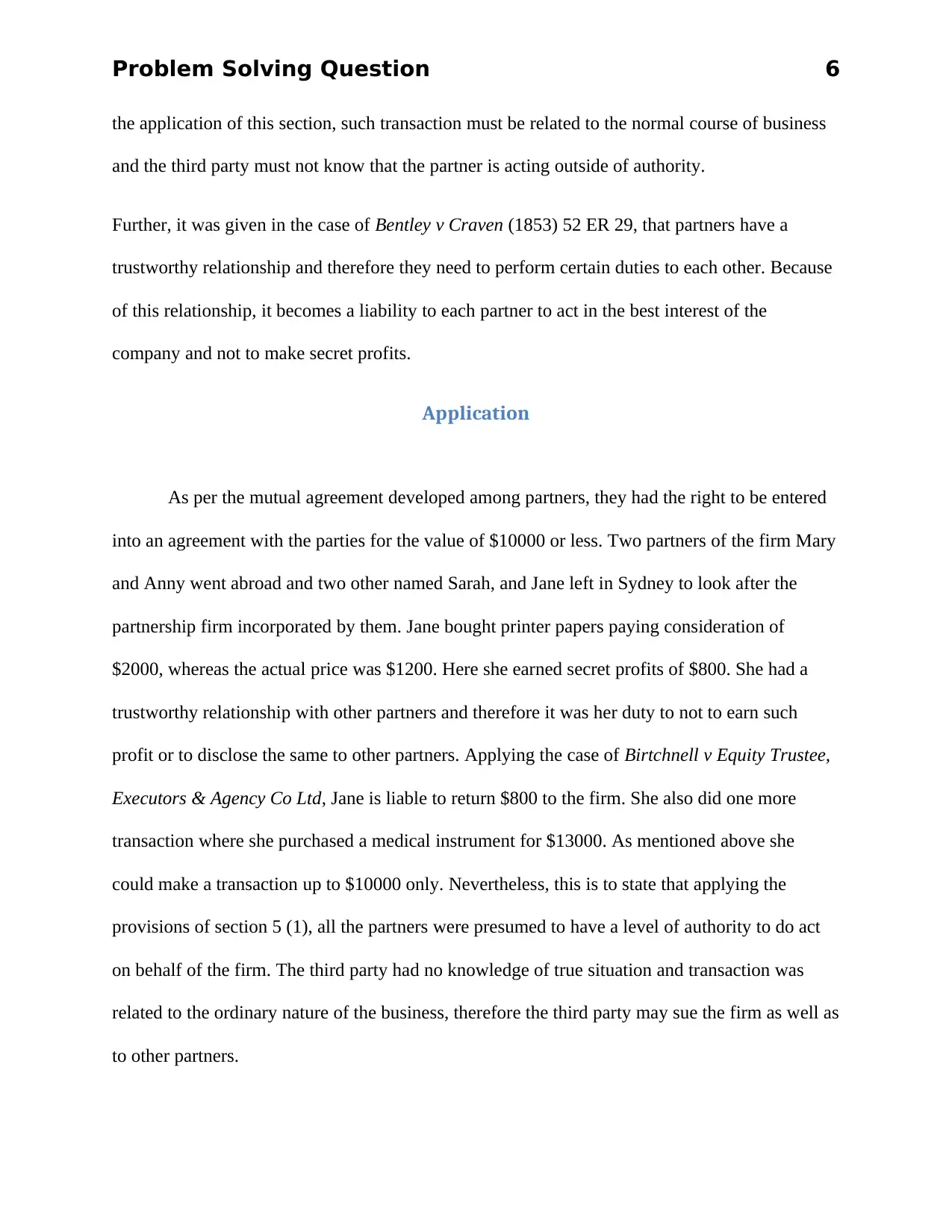
Problem Solving Question 6
the application of this section, such transaction must be related to the normal course of business
and the third party must not know that the partner is acting outside of authority.
Further, it was given in the case of Bentley v Craven (1853) 52 ER 29, that partners have a
trustworthy relationship and therefore they need to perform certain duties to each other. Because
of this relationship, it becomes a liability to each partner to act in the best interest of the
company and not to make secret profits.
Application
As per the mutual agreement developed among partners, they had the right to be entered
into an agreement with the parties for the value of $10000 or less. Two partners of the firm Mary
and Anny went abroad and two other named Sarah, and Jane left in Sydney to look after the
partnership firm incorporated by them. Jane bought printer papers paying consideration of
$2000, whereas the actual price was $1200. Here she earned secret profits of $800. She had a
trustworthy relationship with other partners and therefore it was her duty to not to earn such
profit or to disclose the same to other partners. Applying the case of Birtchnell v Equity Trustee,
Executors & Agency Co Ltd, Jane is liable to return $800 to the firm. She also did one more
transaction where she purchased a medical instrument for $13000. As mentioned above she
could make a transaction up to $10000 only. Nevertheless, this is to state that applying the
provisions of section 5 (1), all the partners were presumed to have a level of authority to do act
on behalf of the firm. The third party had no knowledge of true situation and transaction was
related to the ordinary nature of the business, therefore the third party may sue the firm as well as
to other partners.
the application of this section, such transaction must be related to the normal course of business
and the third party must not know that the partner is acting outside of authority.
Further, it was given in the case of Bentley v Craven (1853) 52 ER 29, that partners have a
trustworthy relationship and therefore they need to perform certain duties to each other. Because
of this relationship, it becomes a liability to each partner to act in the best interest of the
company and not to make secret profits.
Application
As per the mutual agreement developed among partners, they had the right to be entered
into an agreement with the parties for the value of $10000 or less. Two partners of the firm Mary
and Anny went abroad and two other named Sarah, and Jane left in Sydney to look after the
partnership firm incorporated by them. Jane bought printer papers paying consideration of
$2000, whereas the actual price was $1200. Here she earned secret profits of $800. She had a
trustworthy relationship with other partners and therefore it was her duty to not to earn such
profit or to disclose the same to other partners. Applying the case of Birtchnell v Equity Trustee,
Executors & Agency Co Ltd, Jane is liable to return $800 to the firm. She also did one more
transaction where she purchased a medical instrument for $13000. As mentioned above she
could make a transaction up to $10000 only. Nevertheless, this is to state that applying the
provisions of section 5 (1), all the partners were presumed to have a level of authority to do act
on behalf of the firm. The third party had no knowledge of true situation and transaction was
related to the ordinary nature of the business, therefore the third party may sue the firm as well as
to other partners.
Paraphrase This Document
Need a fresh take? Get an instant paraphrase of this document with our AI Paraphraser
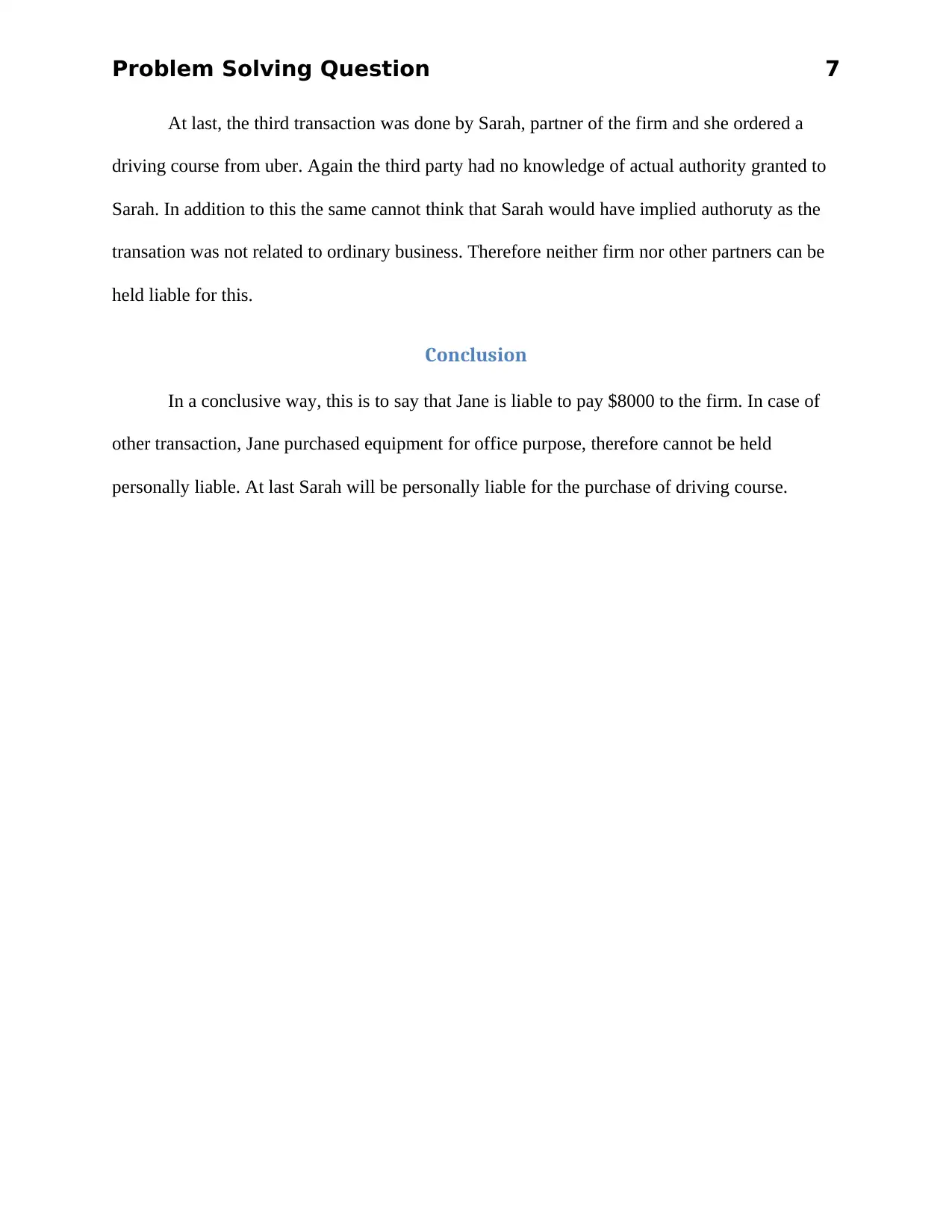
Problem Solving Question 7
At last, the third transaction was done by Sarah, partner of the firm and she ordered a
driving course from uber. Again the third party had no knowledge of actual authority granted to
Sarah. In addition to this the same cannot think that Sarah would have implied authoruty as the
transation was not related to ordinary business. Therefore neither firm nor other partners can be
held liable for this.
Conclusion
In a conclusive way, this is to say that Jane is liable to pay $8000 to the firm. In case of
other transaction, Jane purchased equipment for office purpose, therefore cannot be held
personally liable. At last Sarah will be personally liable for the purchase of driving course.
At last, the third transaction was done by Sarah, partner of the firm and she ordered a
driving course from uber. Again the third party had no knowledge of actual authority granted to
Sarah. In addition to this the same cannot think that Sarah would have implied authoruty as the
transation was not related to ordinary business. Therefore neither firm nor other partners can be
held liable for this.
Conclusion
In a conclusive way, this is to say that Jane is liable to pay $8000 to the firm. In case of
other transaction, Jane purchased equipment for office purpose, therefore cannot be held
personally liable. At last Sarah will be personally liable for the purchase of driving course.
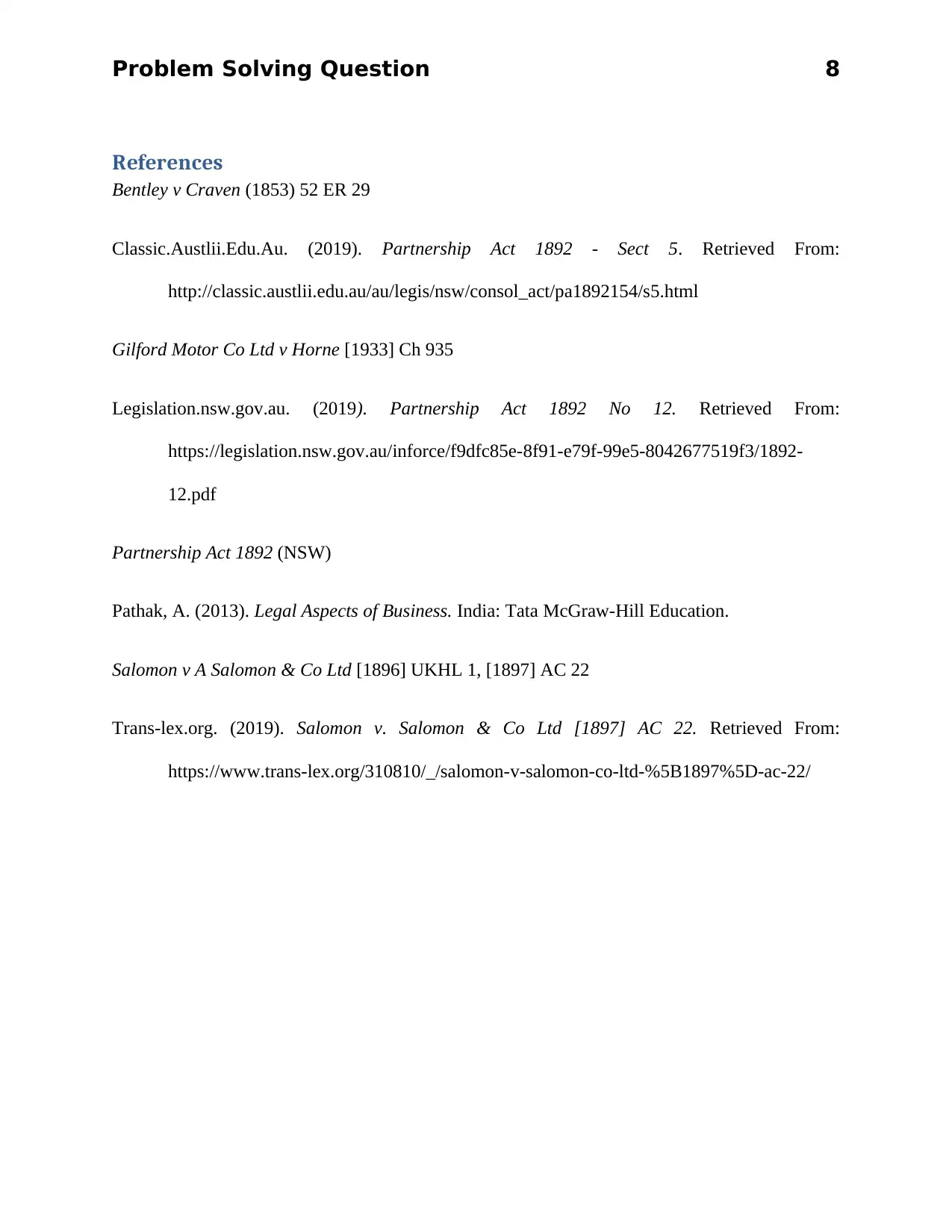
Problem Solving Question 8
References
Bentley v Craven (1853) 52 ER 29
Classic.Austlii.Edu.Au. (2019). Partnership Act 1892 - Sect 5. Retrieved From:
http://classic.austlii.edu.au/au/legis/nsw/consol_act/pa1892154/s5.html
Gilford Motor Co Ltd v Horne [1933] Ch 935
Legislation.nsw.gov.au. (2019). Partnership Act 1892 No 12. Retrieved From:
https://legislation.nsw.gov.au/inforce/f9dfc85e-8f91-e79f-99e5-8042677519f3/1892-
12.pdf
Partnership Act 1892 (NSW)
Pathak, A. (2013). Legal Aspects of Business. India: Tata McGraw-Hill Education.
Salomon v A Salomon & Co Ltd [1896] UKHL 1, [1897] AC 22
Trans-lex.org. (2019). Salomon v. Salomon & Co Ltd [1897] AC 22. Retrieved From:
https://www.trans-lex.org/310810/_/salomon-v-salomon-co-ltd-%5B1897%5D-ac-22/
References
Bentley v Craven (1853) 52 ER 29
Classic.Austlii.Edu.Au. (2019). Partnership Act 1892 - Sect 5. Retrieved From:
http://classic.austlii.edu.au/au/legis/nsw/consol_act/pa1892154/s5.html
Gilford Motor Co Ltd v Horne [1933] Ch 935
Legislation.nsw.gov.au. (2019). Partnership Act 1892 No 12. Retrieved From:
https://legislation.nsw.gov.au/inforce/f9dfc85e-8f91-e79f-99e5-8042677519f3/1892-
12.pdf
Partnership Act 1892 (NSW)
Pathak, A. (2013). Legal Aspects of Business. India: Tata McGraw-Hill Education.
Salomon v A Salomon & Co Ltd [1896] UKHL 1, [1897] AC 22
Trans-lex.org. (2019). Salomon v. Salomon & Co Ltd [1897] AC 22. Retrieved From:
https://www.trans-lex.org/310810/_/salomon-v-salomon-co-ltd-%5B1897%5D-ac-22/
⊘ This is a preview!⊘
Do you want full access?
Subscribe today to unlock all pages.

Trusted by 1+ million students worldwide
1 out of 9
Related Documents
Your All-in-One AI-Powered Toolkit for Academic Success.
+13062052269
info@desklib.com
Available 24*7 on WhatsApp / Email
![[object Object]](/_next/static/media/star-bottom.7253800d.svg)
Unlock your academic potential
Copyright © 2020–2026 A2Z Services. All Rights Reserved. Developed and managed by ZUCOL.





